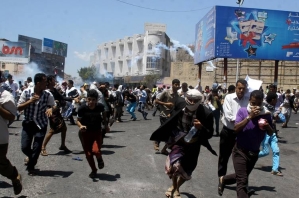
The lack of a cohesive central government, along with loyalties divided on tribal lines, has threatened to destabilize Yemen into a civil war. However, the chaos in that country also brought to light the complicated relationship between the United States and Iran in the Middle East.
According to Jim Michaels of USA Today, Iran seems to be the big winner in the current Yemen crisis. That's because the increasing violence has driven out U.S. advisers from that country, which until recently was highlighted as a key U.S. counterterrorism partner.
"We're dealing with each problem as a vexing one-off issue," retired Marine Gen. James Mattis, who once headed U.S. Central Command, said. "We need a new Mideast security architecture to deal with what's happening."
Michaels reported that U.S.-backed Yemeni president Abed Rabbo Mansour Hadi fled the capital, while rebels backed by Iran tightened their control in parts of the country. In addition, Iran has backed militias fighting ISIS in Iraq and supported Syria's leader, president Bashar Assad, during the four-year civil war there.
"[Iran] will emerge, whether we like it or not, as the central power in their sphere," Aaron David Miller, an analyst at the Wilson Center and former State Department official, said.
According to Michaels, the Houthi rebels managed to overthrow Hadi's government last month as U.S. special operations forces advising Yemen's military were evacuated. Retired Army Gen. Jack Keane described that event as "a stunning setback for U.S. policy, which sadly resulted in a U.S. military retreat from Yemen."
"The Hadi government said Iran has provided support to the Houthi insurgents," Michaels wrote. "The Houthis, a Shiite group, deny they receive aid from Iran."
However, Karl Vick of Time reported that when comes to taking out ISIS in Iraq, both Iran and the U.S. are on the same page. He elaborated on the complicated relationship between both countries.
"In Iraq on Wednesday, U.S. warplanes began providing air cover to Iranian-backed militias in Tikrit, in a joint effort against the Islamic State of Iraq and greater Syria (ISIS) coordinated through the Iraqi government," Vick wrote. "On the same day, 1,200 miles to the south in Yemen, the U.S. was providing guidance to Saudi pilots bombing Shia insurgents who are supported by Iran. So the U.S. was bombing Iran's enemies in one country, and helping to bomb Iran's allies in another."
Keane highlighted the different approaches both countries used in combating ISIS in Iraq. According to Michaels, the U.S. has sent hundreds of trainers and advisers to Iraq, but Iran's elite Quds force fights alongside Shiite militias in Iraq.
"The Iraqis will tell you that the Iranians are doing the things they would like America to do," Keane said. "The Iranians have boots on the ground."
Some analysts thought that U.S.-Iran cooperation in Iraq seems to be a good thing, given that they fighting the same enemies. Jonah Blank, an analyst at RAND, indicated to Michaels that fighting Sunni extremist groups like ISIS and al-Qaida can be advantageous for both countries.
"From the U.S. perspective, Iran's role in the region is actually a good thing," Blank said.
However, Vick thought that the U.S. could learn a lesson from the chaos currently happening in Yemen.
"In peace, Yemen is an amazing country to visit," Vick wrote. "It's also an ideal example of what happens when a state collapses-or really, never coalesces in the first place. And that lesson really explains what the United States is doing in both Yemen and Iraq."






